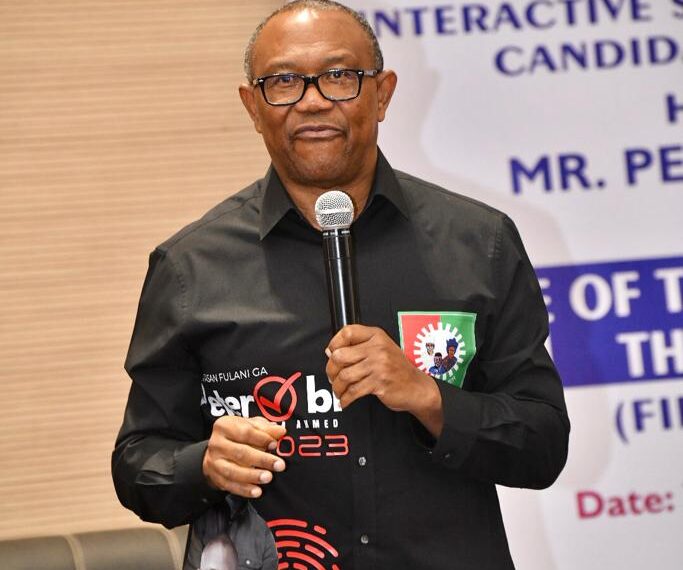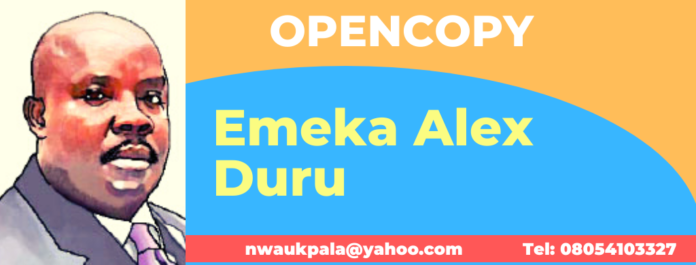Nigerians need issues of hunger and poverty presently holding them down to be tackled. They need assurances of a better future for their children. They need adequate security for their businesses and properties. These are the issues that matter to the citizens. Peter Obi is not the issue.
By Emeka Alex Duru
In my article of November 3, 2023 on, ‘How democracy dies in Nigeria’, I made extrapolations from the 2018 publication on comparative politics by Harvard University political scientists, Steven Levitsky and Daniel Ziblatt, titled; ‘How Democracies Die’. The book alerts on how leaders can subvert the democratic process to increase their power. It warns; “Democracies may die at the hands not of generals but of elected leaders – presidents or prime ministers who subvert the very process that brought them to power”.

To avert the situation, the authors recommend mutual tolerance and respect for the political legitimacy of the opposition. They also stress the importance of respecting the opinions of those of different orientations. Levitsky and Ziblatt further advise against denial of legitimacy of the opponents, by which parties in power, cast their rivals as criminals, subversive, unpatriotic or a threat to national security or the existing way of life.
Nigeria’s current democratic experiment fits into the scenes in the book. In the frenzy to remain in power, foot soldiers of the Bola Ahmed Tinubu presidency have pranced about in manners that give them out as lacking in decency and decorum. Consequently, they undermine all known institutions of democracy, trample on their opponents in a carriage that suggests that they are the lords of the manor, before whom other Nigerians must grovel. To have their way, the opposition is rendered irrelevant, or cast in a way that portrays it as a threat to the nation.
This has been the lot of Peter Obi, the candidate of Labour Party (LP) in the 2023 presidential election. Since the controversial declaration of Tinubu as the winner of the poll by the Prof Mahmood Yakubu-led Independent National Electoral Commission (INEC) and his subsequent inauguration as president, Obi has been marked for vilification by attack dogs of the administration.
READ ALSO:
From the ethnically bigoted media adviser to the president, Bayo Onanuga, to hangers-on, such as social media creation, Reno Omokri; garrulous ex-Lagos State All Progressives Congress (APC) spokesman, Joe Igbokwe and lately, the erstwhile Director-General of the LP presidential campaigns, Doyin Okupe, there seems a brief on leaving the burning issues in the land and focusing on Obi. In going about the exercise, allegations that range from infantile to puerile, are thrown up to cast the LP flag bearer as ‘bad boy’ of the society. In fact, there is nothing being spared, including Obi’s family and his private life.
The APC National Publicity Secretary, Felix Morka, has joined the odious league. In a television interview earlier in the week, Morka accused Obi of seeking to incite Nigerians into bringing down the current government.
Morka said, “Mr. Obi is shooting from the hip. He is not looking or taking an aim. He just shoots widely like the Wild -Wild -West movies we used to see back in the day. He is absolutely irrational in his thinking about a man who was governor for eight years and left nothing to remember in Anambra State by way of legacy.
“Now that he didn’t win, he is sulking. Rather than get a perspective or figure out why he lost so he can do better in the future, he thinks he can bring down the government by simply being maliciously deceptive. That is wrong.
“I am not somebody to go on the offensive in that manner, but Mr. Peter Obi has crossed the line so many times, and I think that at this point, he has come to him whatever he gets.”
Obi’s sin is his New Year message to Nigerians where he observed that the political, economic and security situation of the country is worsening daily, despite contrary positions and claims by the government of improvement in different spheres of human endeavour. Obi cited instances to back his remarks. He said; “As a nation, we have fallen from being the largest economy in Africa, with a GDP of $574 billion and a per capita income of over $3,500 in 2014, to now ranking fourth on the continent. Our current GDP is less than 50% of what it was a decade ago, standing at approximately $200 billion, with a per capita income of barely $1,000.
“Nigeria remains one of the most insecure and least peaceful nations in the world, with countless communities and families displaced from their homes and now living in IDP camps. According to the Global Peace Index (GPI), Nigeria ranks 143rd out of 163 countries in terms of peacefulness – an indication of a high level of distress”.
Obi did not only point out areas the government is not doing well. He also offered suggestions on how to get things right, including an advice on the administration to commence a visible and verifiable reduction in the cost of governance to allocate much-needed resources to critical areas of development, such as security, health, education, and poverty alleviation.
He further suggested that all future borrowing must be tied to regenerative investments and visible, productive assets that benefit the nation. “This will ensure both productivity and the ability to service and amortize such loans, rather than continuing the current practice of accumulating massive debt with no tangible returns, which places undue strain on future development revenue”, he said.
Now, you may accuse Obi of being abreast of the statistics but not inventing them. The facts are already in the public domain. For example, a recent disclosure by the Nigerian Bureau of Statistics’ Crime Experience and Security Perception Report, 2024, indicated that Nigeria recorded a total of 2.23 million kidnapping incidents during the year. During the reference period, N2.2tn was paid as ransom by Nigerians.
The Bureau had earlier in 2022 classified 133 million Nigerians as multidimensionally poor. The figure represented 63 per cent of the nation’s population. The poverty level ranged from a low of 27 per cent in Ondo to a high of 91 per cent in Sokoto. The report added that over half of the population who were poor cooked with dung, wood or charcoal, rather than cleaner energy.
Elsewhere, market surveys show that a bag of rice that was bought at N30,000 before the current administration, sells at over N90,000 or more, depending on location and quality. The same measure of Garri that was sold at N1,200, now sells for N2,500, in some places, higher. House rents have gone up, transport fares hiked, companies are closing shops and families in disarray due to unbearable hardship.
There is therefore a limit to which Peter Obi can be blamed or made scape goat of the situation at hand. He is, after all, a member of the opposition, playing the role of keeping the government and ruling party on their toes. Obi and the Labour Party which he leads, should not be seen on the same bed with the government, if it (the government) is not on the right path.
What is rather required is for President Tinubu and his team to roll up their pants and approach the task of governance with the vigour it entails. Achieving that demands having a clear agenda, carrying the people along and doing away with propaganda. Nigerians need issues of hunger and poverty presently holding them down to be tackled. They need assurances of a better future for their children. They need adequate security for their businesses and properties. These are the issues that matter to the citizens. Peter Obi is not the issue.












